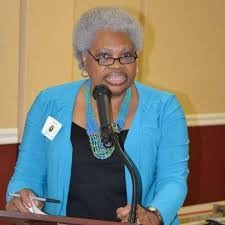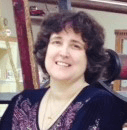The Frazine K. Taylor African American Research Scholarship (application due by 1 March each year) — open to anyone committed to expanding their knowledge of African American genealogical research.
 The Frazine K. Taylor African American Research Scholarship (application due 1 March each year) was established on 7 June 2018 by Deborah A. Abbott, PhD, in honor of Frazine K. Taylor upon her retirement as coordinator of the “Researching African American Ancestors” course at the Institute of Genealogy and Historical Research. This scholarship for IGHR tuition is open to anyone committed to expanding their knowledge of African American genealogical research. Taylor proposed and organized the first biennial African American course at IGHR in 2004.
The Frazine K. Taylor African American Research Scholarship (application due 1 March each year) was established on 7 June 2018 by Deborah A. Abbott, PhD, in honor of Frazine K. Taylor upon her retirement as coordinator of the “Researching African American Ancestors” course at the Institute of Genealogy and Historical Research. This scholarship for IGHR tuition is open to anyone committed to expanding their knowledge of African American genealogical research. Taylor proposed and organized the first biennial African American course at IGHR in 2004.
Frazine K. Taylor is a former Peace Corps volunteer and administrator who served in the Fiji Islands and traveled extensively in the South Pacific before earning her Master of Information Studies degree from Atlanta University. She has over twenty years’ experience as a librarian, archivist, lecturer, and writer and has received numerous awards during her career including Employee of the Year from the Alabama State Employee Association. She is the former Head of Reference for the Alabama Department of Archives and History (ADAH) and was an expert on Alabama records at ADAH. She is also the author of Researching African American Genealogy in Alabama: A Resource Guide published in 2008.
For IGHR 2022, this scholarship is limited to individuals who are interested in enrolling in Course 11 – Researching African American Ancestors: Courthouse Records. The scholarship will be awarded to the applicant who demonstrates a passion for African American genealogy and the ability to communicate that commitment in writing. This scholarship covers tuition only.
Applications are due by 1 March. The winner will be notified no later than 15 May. Please include the following in your application:
- Name
- Address
- Phone
- Are you self-employed or working for a company as a professional genealogist?
- Are you employed by a Library or Archive? Where employed?
- Number of years you have been conducting genealogical research.
- In 500 words or less (one printed page), a description of how participation in this course will benefit you.
Applications should be submitted via email to Deborah Abbott dbrhabbott@yahoo.com by 1 March and the subject line should read Taylor Scholarship.
2019 Frazine K. Taylor African American Research Scholarship Winner
 Congratulations to Mary K. Mannix winner of the 2019 Frazine K. Taylor African American Research Scholarship. She will be taking Course Ten — Building an African American Research Toolbox with Timothy Pinnick in July. Mary is the Maryland Room Manager of the C. Burr Artz Public Library of the Frederick County Public Libraries, a position she has held since 1998. She holds a MLS from the University of Maryland, College Park and an MA in American History from the University of Delaware with a certificate in Museum Studies. Mary is very active in the Mid-Atlantic Regional Archives Conference and has been very involved in the History Section of RUSA, she was the 2011 winner of ALA’s Genealogical Publishing Company Award for service to the profession. In 2015 Mary was given the Martha Washington Medal from the Sergeant Lawrence Everhart Chapter of the Maryland Society of Sons of the American Revolution. She has taught genealogy librarianship at the University of Maryland and public history courses at Hood College.
Congratulations to Mary K. Mannix winner of the 2019 Frazine K. Taylor African American Research Scholarship. She will be taking Course Ten — Building an African American Research Toolbox with Timothy Pinnick in July. Mary is the Maryland Room Manager of the C. Burr Artz Public Library of the Frederick County Public Libraries, a position she has held since 1998. She holds a MLS from the University of Maryland, College Park and an MA in American History from the University of Delaware with a certificate in Museum Studies. Mary is very active in the Mid-Atlantic Regional Archives Conference and has been very involved in the History Section of RUSA, she was the 2011 winner of ALA’s Genealogical Publishing Company Award for service to the profession. In 2015 Mary was given the Martha Washington Medal from the Sergeant Lawrence Everhart Chapter of the Maryland Society of Sons of the American Revolution. She has taught genealogy librarianship at the University of Maryland and public history courses at Hood College.
“My reasons for applying for the Frazine K. Taylor African American Research Scholarship were multifaceted. As is common amongst many information professionals, I learned my genealogical skills not in an academic setting but from working directly with family historians, both my patrons and my volunteers. I had no formal training either in basic genealogy methodology or in such specialized fields as African American genealogy. I now teach genealogy in a variety of settings and feel a responsibility to make sure my students receive the formal training that I did not have the opportunity to obtain. I, therefore, need to become much more confident in my understanding of Black genealogy, the sources, and methodology. The Maryland Room actively collects materials, both primary and secondary, to help researchers investigate their African American families. I have a responsibility to make the best use possible of these items and make sure that access to them is broad. The Maryland Room also works very closely with our local African American history group, we partner in programming, attend each other’s events, and assist with research projects. We want to do the best we can for our colleagues, and live up to the trust that they place in us. As a public library it is vital that we are able to assist anyone doing their African American history no matter where there people are from. We are the only local history collection staffed by library professionals in our county. Our colleagues in the African American history group do not yet have an institution or a formal place for researchers to access their collection. Due to all of these factors, I feel a strong responsibility to increase my formal understanding of African American family history. There is a gap in my community and I would love to be able to contribute to filling it.”

